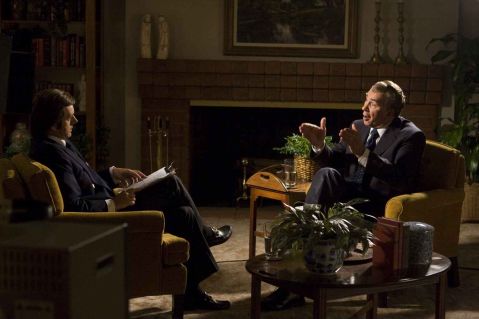Frost/Nixon
Frank Langella, Michael Sheen, and Sam Rockwell star in a film written by Peter Morgan and directed by Ron Howard.

Shakespeare’s historical plays are compelling because his characters somehow manage to be indelibly personal, as well as effectively allegorical. They stand on their own and they stand for something: Falstaff is unforgettably witty and a Lord of Misrule; Richard III is an oily salesman and the embodiment of Machiavelli’s perfect prince. Peter Morgan’s political plays, like The Queen and now, Frost/Nixon, work because his characters stand between two worlds – the traditional and, for want of better terms, the postmodern impact of television’s glare. In The Queen, Elizabeth must abandon dignity for the overwhelming sentiment of her people (egged on by BBC newscasters) after Diana dies. In this play, adapted by Ron Howard to film, both Nixon and Frost are at defining cruxes of modern life. Frost wades up from entertainment to journalism, while Nixon falls and keeps falling via his sententious pride and arrogant misunderstanding of the mass media. Even telephones let him down.
If this sounds abstract, don’t fret. The film is anything but programmatic. In fact, its chief fault is the excessive burnishing of these historical foes. David Frost (host of That Was the Week That Was) was once the John Stewart of his time. Here he’s trivialized and then made triumphant. Nixon, in the great false step of this film, is nearly made into a Miltonic hero. (The ultimate act of liberalism is the redemption of Tricky Dick.) I’m not saying pity is wrong, but Nixon’s policies murdered millions unjustly. He corrupted the American presidency.
Howard’s not a great filmmaker, but this time he has many obvious advantages. The casting and performances are soaringly good. Langella’s hulking dismay and puffed-up egotism seem touchingly true, but the equally brilliant Michael Sheen as Frost also offers a dizzying array of emotions in a single glance. Here, Howard is aided by something present in the play: the use of the close-up as metaphor. As one character reminds us, close-ups simplify complex political ideas into sweaty upper lips or icy blue eyes. In this film, each actor brings such abundance to the screen it re-complicates what might have been T.V. morality. Like Shakespeare’s historical pageants, it makes the political personal and the truth more compelling than a mere assembly of facts.



